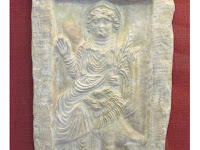

| Online: | |
| Visits: | |
| Stories: |

| Story Views | |
| Now: | |
| Last Hour: | |
| Last 24 Hours: | |
| Total: | |
“Tony Costa Sent Me To The Hospital” A Close Call for Ijaz Ahmad and the Allat Syndrome
That’s right folks, you read that correctly! I sent Ijaz Ahmad to the hospital! No, I did not engage in any physical altercation with Ijaz to send him to the hospital. Apparently it was based on something I never said that caused Ijaz to convulse with laughter which triggered symptoms of a severe chronic illness which he has that landed him in a hospital. What was it that I said that caused Ijaz such convulsions? In a commentary piece where I was reviewing a debate I had with my good friend Sadat Anwar I spoke about the daughters of Allah in the Qur’an 53:19-20. I then made this statement, “Al-Lat is actually the feminine form of ‘Al-ilah’ or ‘Allah’”. You can find the source in my commentary on paragraph 7 if you go here. I invite all my readers, including our Muslim friends to see my exact quotation for yourselves. With my statement a massive firestorm erupted with Ijaz with an incredible array of accusations which you can find in Ijaz’s blog here. Some of Ijaz’s accusations against me includes the following:
1) “Over the course of last night and this morning, I had the unfortunate experience of seeing Dr. Costa pretend to know the Arabic language…So basic was his error, everyone knew that he was pretending to know the Arabic language… Dr. Tony Costa pretending to know Arabic and failing at it, sent me to the hospital. Thank you Tony, thank you.“
I have never pretended to know the Arabic language, nor did I make such a claim. In fact I openly admitted in my debate with Sadat Anwar that I am presently learning and studying Arabic. See my own comments at the debate video here (at 1:36:00). Please see my commentary and check if I ever made such a claim.
2) “To settle the matter, I simply asked Dr. Tony if he could kindly give me the morphology of the term آله. For anyone who has done more than one week of Arabic, you’d know how to derive the female from this root word. He was unable to do so, in fact, he outright refused to do so. Tony insisted that his finding the female of آله had nothing to do with using the root of the word.”
Notice again that Ijaz is asking me to provide something I never said in my blog commentary.Why would I give the morphology of the term آله when I never addressed the forms of words in Arabic? I simply made the statement that Al-Lat [a pre-Islamic Arabian goddess pictured on the right corner above; picture from Ba‘alshamîn temple in Palmyra, first century A.D.] was the feminine form of Allah, and I will shortly provide the academic backing for this claim below. In fact, as we shall see, I am not the one who made up this statement nor am I the first to make it! Ijaz goes on to assert, “Tony insisted that his finding the female of آله had nothing to do with using the root of the word.” Again, we shall see what the academics in the field have said. You will notice Ijaz is advancing arguments that have gone far beyond what I actually stated in blog article.
3) “Apparently Tony studied sarf (morphology) to the point where he does not use the root of words to derive their sexes and numerical forms. Considering you need to use root words to derive any other form of the word, I’m not sure what planet he believed he was on.”
Again, where in my blog article did I say I studied “sarf (morphology)”? Ijaz is accusing me of something I never claimed or said.
So, what is the source for my claim that “Al-Lat is actually the feminine form of ‘Al-ilah’ or ‘Allah’”? Was I actually in error as Ijaz suggests for making this claim? Let’s see what scholars have said on Al-Lat and Allah whether Al-Lat is the feminine form of Allah. All bold italics below are my own:
“The name Allah, as the Qur’an itself is witness, was well known in pre-Islamic Arabia. Indeed, both it and its feminine form, Allat, are found not infrequently among the theophorous names in inscriptions from North Arabia.” – Arthur Jeffrey, Islam: Muhammad and His Religion (The Library of Religion; Volume 6; New York, N.Y.: Merrill, 1958), p. 85
“The word vul’hiduna is used in the later Arabic for any form of atheism. The expression in the text means the perversion, as Muhammad called it, of the name Allah in the names of other allahs, such as Allat, the feminine form of the same word.” – R. A. Nicholson, The Koran: The Holy Book of Islam with Introduction and Notes (trans. E. H. Palmer; Sacred Texts; London, U.K.: Watkins Publishing, 2012), Chap. VII n23.
“More important were the three goddesses of central Arabia: Manat (“Destiny”), Allat (feminine form of Allah), and Al’ Uzza (“the Powerful”). Regarded as ‘the daughters of Allah’”. – Mircea Eliade, A History of Religious Ideas (trans. Alf Hiltebeitel and Diane Apostolos-Cappadona; Volume 3: From Muhammad to the Age of Reforms; Chicago, Ill / London: U.K.: University of Chicago Press, 1985), p. 64
“a triple GODDESS associated with Arabian star-worship of Venus as the morning-evening star who is named briefly (Q 53:20) in the Qur’an as Allat (fem.[inine] of Allah, lit.[erally] “the Goddess”) - Juan E. Campo, Encyclopedia of Islam (Encyclopedia of World Religions; New York, N.Y.: Facts on File, 2009), p. 343
“The second, treating al-Lāt as consort of Allāh or of his prototype II or El, simplifies the problem, taking al-Lāt to be a feminine form of Allāh or al-Ilāh, unnamed god of the pre-Islamic Arab pantheon.” - Fahd, T.. “al-Lāt,” in Encyclopaedia of Islam, Second Edition. Edited by: P. Bearman, Th. Bianquis, C.E. Bosworth, E. van Donzel, W.P. Heinrichs. Brill Online, 2016.
“Allat, the feminine of Allah, an idol mentioned in the Qur’an”. – Friedrich Max Müller, Natural Religion (London / New York: Longmans, Green, and Co.; 1889), p. 527 n1
“Allat (‘Goddess’, the female counterpart of Allah).” – Kevin Butcher, Roman Syria and the Near East (Los Angeles, CA: Getty Publications, 2003), p. 340
You will notice that Ijaz engaged in two well known fallacies. The first is known as ignoratio elenchi or as it is better known, a red herring argument. This fallacy is committed when one changes the subject or argues a point of irrelevance. All I did was make a statement which as noted above is supported by academic sources. Instead of engaging the sources, Ijaz charged me personally with not knowing Arabic (another fallacy known as argumentum ad hominem, attacking the person rather than the argument), and then veering off into Arabic morphology and root words, issues which I did not even raise or address in my article. In other words, Ijaz was arguing rom irrelevant material. The second fallacy is that of the straw man argument. This fallacy is committed when you attribute something false either by way of a position or belief to your opponent that he / she does not believe and then proceed to deconstruct the argument and claim you have won the debate. Ijaz argued I did not know Arabic, which I never claimed I did, and then he argued about Arabic morphology, issues again that I never raised. Once again I invite the careful reader to read my blog article and see where I claimed to know Arabic or Arabic morphology. When we engage with one another we should endeavor to represent each other accurately based on what has been published or written by either side and not by attributing or putting words in the other person’s mouth. That is a gross misrepresentation. We don’t win an argument by changing the subject, or by false characterization of one’s opponent.
I call on all my Christian brothers and sisters to pray for Ijaz, that God may be merciful and bring healing to him, and most of all, that God will open his heart and draw him to a saving knowledge of the Lord Jesus Christ, that he may go from being a brother in Adam, to being a brother in Christ. That is my prayer and I trust it will be your as well.
Source: http://www.answeringmuslims.com/2016/05/tony-costa-sent-me-to-hospital-close.html




